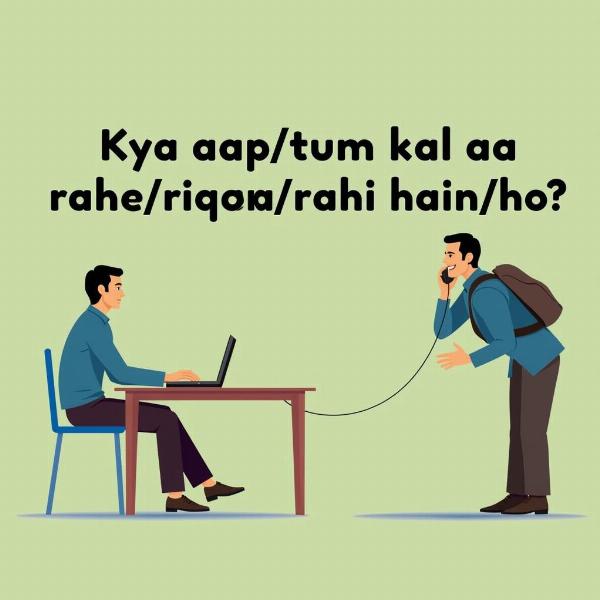Understanding how to say “I will be coming tomorrow” in Hindi can be tricky, as direct translations often don’t capture the nuances of the language. This article explores various ways to express this phrase accurately and naturally, considering cultural context and common usage. We’ll delve into the different levels of formality, regional variations, and even explore some related expressions to equip you with the perfect phrase for any situation.
Different Ways to Say “I Will Be Coming Tomorrow” in Hindi
There isn’t one single perfect translation for “I will be coming tomorrow” in Hindi. The best option depends on the context and your relationship with the person you’re speaking to. Here are a few common and accurate translations:
-
Main kal aaunga (मैं कल आऊँगा): This is a standard and widely understood translation, suitable for most informal situations. “Main” means “I,” “kal” means “tomorrow,” and “aaunga” is the future tense of the verb “aana” (to come). This is generally used by males.
-
Main kal aaungi (मैं कल आऊँगी): This is the feminine equivalent of the previous phrase, used by females.
-
Kal aaunga/aaungi (कल आऊँगा/आऊँगी): This shorter version is more casual and often used in conversations with friends and family. It omits the pronoun “main” (I), as it’s implied.
-
Main kal aa raha/rahi hoon (मैं कल आ रहा/रही हूँ): This translates to “I am coming tomorrow.” This phrase implies that the action of coming is already in progress, even though you haven’t physically started your journey yet. It indicates a more definite plan. Men use “raha,” while women use “rahi.”
-
Main kal jaroor aaunga/aaungi (मैं कल ज़रूर आऊँगा/आऊँगी): Adding “jaroor” (certainly/definitely) emphasizes the certainty of your arrival. This is useful if you want to reassure someone that you will be there without fail.
Formal vs. Informal Usage
The level of formality also plays a role in choosing the appropriate phrase. While the options listed above are generally acceptable in most situations, a more formal context might require a slightly different approach. For example, when addressing an elder or someone in a position of authority, you could use:
- Main kal aane ki koshish karunga/karungi (मैं कल आने की कोशिश करूँगा/करूँगी): This translates to “I will try to come tomorrow.” While it appears less certain, it’s considered more polite in some formal settings.
Regional Variations
Like any language, Hindi has regional variations. While the phrases mentioned above are understood throughout most of India, slight differences might exist in certain dialects. It’s always beneficial to be aware of these nuances, especially if you’re communicating with someone from a specific region.
Related Expressions
Beyond “I will be coming tomorrow,” other related phrases can be useful. For instance:
-
Kya aap kal aa rahe/rahi hain? (क्या आप कल आ रहे/रही हैं?): This is how you ask someone, “Are you coming tomorrow?” using the formal “aap.”
-
Kya tum kal aa rahe/rahi ho? (क्या तुम कल आ रहे/रही हो?): This is the informal version of the question, using “tum.”
 Are You Coming Tomorrow in Hindi
Are You Coming Tomorrow in Hindi
Why Accurate Translation Matters
Using the right phrase can make a significant difference in communication. It demonstrates respect for the language and culture and ensures that your message is conveyed clearly and effectively. jo in hindi meaning
I Will Be Coming Tomorrow: Responding to the Query
What if someone asks you if you’ll be coming tomorrow? Here are a few ways you can respond:
-
Haan, main kal aaunga/aaungi (हाँ, मैं कल आऊँगा/आऊँगी): “Yes, I will be coming tomorrow.”
-
Shayad (शायद): “Maybe.”
-
Mujhe nahin pata (मुझे नहीं पता): “I don’t know.”
-
Nahin, main kal nahin aa sakta/sakti (नहीं, मैं कल नहीं आ सकता/सकती): “No, I cannot come tomorrow.”
Conclusion
Mastering the different ways to say “I will be coming tomorrow” in Hindi allows for clear and nuanced communication. By understanding the context, formality, and regional variations, you can choose the most appropriate phrase and avoid misunderstandings. This not only helps you express yourself accurately but also demonstrates your respect for the Hindi language and Indian culture. Remember, i have to go there meaning in hindi or for real meaning in hindi can further enhance your communication skills.
FAQ
-
What is the most common way to say “I will be coming tomorrow” in Hindi? Main kal aaunga/aaungi (मैं कल आऊँगा/आऊँगी) is the most common and versatile option.
-
Is there a difference between male and female speakers? Yes, males use aaunga (आऊँगा) while females use aaungi (आऊँगी).
-
How do I say “I will definitely be coming tomorrow”? Add jaroor (ज़रूर) for emphasis: Main kal jaroor aaunga/aaungi (मैं कल ज़रूर आऊँगा/आऊँगी).
-
What’s a more formal way to express this? Main kal aane ki koshish karunga/karungi (मैं कल आने की कोशिश करूँगा/करूँगी) is more polite in formal settings.
-
How do I ask someone if they are coming tomorrow? Kya aap/tum kal aa rahe/rahi hain/ho? (क्या आप/तुम कल आ रहे/रही हैं/हो?) is the question form, with aap being formal and tum informal.
Meaning-Hindi.in is your premier source for accurate and culturally sensitive Hindi translations. We specialize in various translation services, including business and commercial documents, legal and certified translations, technical manuals, website localization, educational and academic materials, and express translation services. Our expertise covers diverse fields, ensuring your message is conveyed with precision and cultural understanding. Contact us today for all your Hindi translation needs! Email: [email protected], Phone: +91 11-4502-7584. Meaning-Hindi.in offers top-quality translations tailored to your specific requirements. milte meaning in hindi can also be helpful for further understanding.